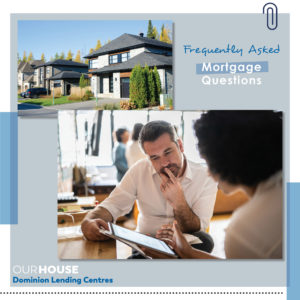
Make Your Mortgage Work for You.
When it comes to mortgages, it can be easy to get overwhelmed by the sheer number of options! Fortunately, we are here to help! Below are some of the mortgage details that you should understand to ensure that you are getting the best mortgage for YOU:
Interest Rate Type
Interest rate is one of the major components to your mortgage and it is important to decide whether you want a fixed-rate, variable-rate or protected (capped) variable-rate mortgage.
A fixed-rate mortgage is ideal for new home owners or those on a fixed income who are more comfortable with a stable monthly payment.
A variable-rate mortgage is ideal for individuals who have room in their budget and want to take advantage of potential interest rate drops – keep in mind, with this mortgage you pay more if the rates go up!
Lastly, the protected (capped) variable-rate mortgage operates similarly to variable-rate, except with a maximum (or capped) rate allowing you to take advantage of interest rate decreases while never paying above a set amount should the rates rise.
Amortization
This is the life of your mortgage and is typically a 25-years period whereby you would pay off the entirety of the loan. You can choose a shorter term, which would result in higher payments but allow you to pay less interest over the lifetime of your mortgage and be mortgage-free faster! Or, you can opt for a longer amortization period, which allows for smaller monthly payments.
Payment Schedule
This is the frequency that you make mortgage payments and ranges from monthly to bi-monthly, bi-weekly, accelerated bi-weekly or even weekly payments. There are many great calculators on My Mortgage Toolbox app (available through Google Play and the iStore) that can help you calculate and compare these payment schedules to see what works best for you.
Mortgage Term
The standard mortgage term is 5-years and refers to the length of time for which options are chosen and agreed upon, such as the interest rate. When the term is up, you have the ability to renegotiate your mortgage at the interest rate of that time and choose the same or different options.
Open vs. Closed
Open mortgages give you the option to increase mortgage payments or make lump sum deposits on your loan. A closed mortgage does not allow additional payments without penalties.
High Ratio vs. Conventional
A conventional mortgage is where you put the standard 20% down on your home. However, as not everyone is able to do this, many buyers will end up with a high-ratio mortgage product. High-ratio mortgages need to be insured due to financial institutions only being allowed to lend up to 80 percent of the homes purchase price WITHOUT mortgage default insurance. Therefore, if you choose a high-ratio mortgages over a conventional one, you will pay a monthly insurance premium.
Contact a DLC mortgage expert today to get started on your homebuying journey with expert advice and solutions to suit YOUR unique needs!
- Written by my DLC Marketing Team

